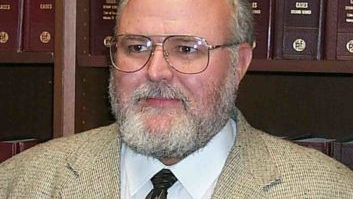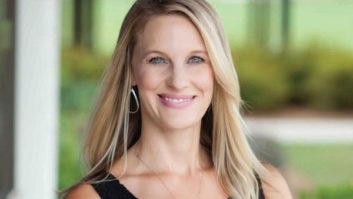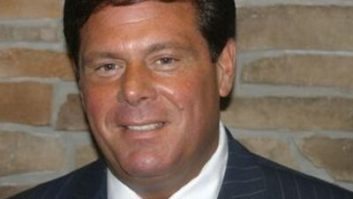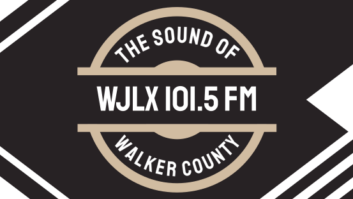Excerpted from the remarks of NAB President/CEO Gordon Smith in his State of the Industry address at the NAB Show in Las Vegas.
At NAB, we’re not worried about technology; we’re excited about the digital world that is reinventing broadcasting. We’re not worried about revenues; broadcasting has bounced back from the worst recession in history.
But we worry about those who would damage our business. And about government in a rush, or over-reaching — that, we worry about.

Gordon Smith. ‘Isn’t it ironic that a former Republican senator is urging the Obama administration not to lose sight of an important segment of its political base?’ © NAB Show Less than two years ago, broadcasters gave up more than 25 percent of TV spectrum and spent $15 billion transitioning from analog to digital television. That was our cost of leaving Howdy Doody analog and moving to high-definition and multi-channel digital. We embraced this digital future so that we could offer dazzling HD programs and multicasting; so we could offer consumers more choices and deliver content on different platforms, such as sending video to smartphones, tablets and laptops.
We spent these billions because we knew we needed to remain relevant to new generations, who expect to get their content on the go. Now, less than two years later, wireless companies want another 40 percent of TV spectrum. Hey … we already gave at the office! So we are in full battle mode to protect broadcasters from being forced to give up spectrum involuntarily.
If a station simply can’t make it and it volunteers to sell its spectrum, that’s fine — as long as it doesn’t harm another station that wants to stay in business and is excited about the future. The problem is that what is voluntary for the former could become involuntary for the latter. It concerns us that the FCC could forcibly relocate a broadcaster, crowd channels closer together, reduce their coverage, destroy innovation for viewers, increase interference or otherwise degrade their signal.
This endangers our digital future, and violates President Obama’s promise to prevent a world of digital haves and have-nots.
Ladies and gentlemen, there is not enough spectrum in the universe to replace our one-to-many broadcast system to a one-to-one transmission architecture. Even the wireless companies themselves concede they will need to eventually use some of their spectrum in a broadcast-type architecture, specifically for sending mass-appeal video content to smartphones.
Broadcasting already has the architecture, and it’s worked for more than 60 years. What sense does it make to take spectrum that is being used efficiently and use it less efficiently?
Is that a public good?
And where exactly, other than dense urban markets like New York and L.A., is this great spectrum shortage? It’s certainly not in rural America.
Wireless carriers are talking about a “looming spectrum crisis” these days. For whatever reason, they seem to have found a sympathetic ear in Washington. Sounds spooky, but the truth is what they really have is a capacity crunch — not a spectrum crisis.
The fact is there has been more spectrum allocated to mobile broadband than there is capital to deploy it.
What is needed to address the capacity crunch is more investment in towers and infrastructure, and receiver standards that maximize the use of the huge swaths of spectrum that wireless carriers have already been allocated. But apparently they have determined that it is cheaper to buy our TV channels at auction than to build out their networks. Hence, spectrum crisis.
One needn’t look any further than the recently announced AT&T and T-Mobile merger to see my point. In announcing their deal, corporate executives stated that one of the greatest benefits of the proposed merger is that AT&T’s network capacity would double by adding T-Mobile’s already built towers in urban areas.
Moreover, recent press reports indicate that certain companies licensed to provide mobile broadband service are simply not making the necessary investments to deploy their service, but instead are sitting on more than $15 billion of spectrum they aren’t using.
Why? Because in the words of one of those CEOs, it’s a good inflation hedge.
Spectrum should not be used for speculation.
I’m not saying there will not be future demands for spectrum to sate consumers’ want for more reliable wireless service, but before anything is done, we believe a respected third party, like the Government Accounting Office, should conduct a comprehensive inventory of what spectrum is out there and more importantly, how much of it is being used today.
Won’t that help us know the best way to meet America’s communications and spectrum needs?
What is there to fear from a comprehensive inventory unless you don’t want people to know what you really have or how you’re using it?
There’s a lot at stake here. So why rush? Once spectrum is reallocated and local TV stations are gone, they won’t be coming back. And at what cost to the 43 million people that rely exclusively on over-the-air television for free?
They don’t have cable. They don’t have satellite. And their numbers are growing, not declining, as evidenced by the growing pay TV cord-cutting phenomenon embraced by younger, tech-savvy viewers. In fact, many who depend on free over-the-air television are older, lower-income, minority and rural viewers. One in three Spanish-speaking households, for example, depend totally on over the air.
Isn’t it ironic that a former Republican senator is urging the Obama administration not to lose sight of an important segment of its political base? They shouldn’t be forgotten so that urbanites can have faster downloads of the latest game or gimmick. …
Now, don’t get me wrong. There are some pretty useful apps out there — I have many on my iPad. But my point is this: Should we risk weakening a broadcasting system that serves a real purpose in American life, a system that is a pillar of our communities for the chance to play more games on our iPads?
Recent projections show the demand for smartphone capacity is likely to slow — mainly because wireless providers want to charge you a fee, while broadcasting comes to you for free. And “free” is better than “fee.”
Another reason may be that while some apps are fun, they are not important to everyday life and their novelty wears off. I’ve got 100 apps on my iPhone, and I use only five or six with any regularity.
But I guarantee that none of those apps comes close to matching what broadcasting contributes to local communities.
So, what we’re saying to the government is keep voluntary, voluntary. Broadcasters have a unique identity. We are important voices in our local communities. We live where we broadcast, and we reflect the values of those communities, large and small across the country. Our competitors say broadcasters are “squatting” on this spectrum. A more legitimate concern is that our competitors will end up “squandering” this spectrum simply for higher fees. …
Freight train
Finally, let me talk about radio. Last year we stopped the legislation that would impose a performance tax on local radio stations. This was a freight train headed for passage.
The White House was for it. Congressional leadership supported it. Both the House and Senate Judiciary Committees had passed it. This put radio in a position of maximum peril.
One of my former colleagues, a congressman who was running for the Senate, once told a town meeting in Mount Pleasant, Michigan: Keep your expectations low because Congress doesn’t have all the answers. “Congress,” he said, “is not the sole suppository of wisdom.”
Now, I think he meant repository, but I have to tell you, the rank and file of 260 members of the House of Representatives — Republican and Democrat alike — with grassroots engagement, by radio and television working together, really came through.
With their help and that of broadcasters across America, we brought the freight train under control by seeking a good faith, workable agreement with the music industry, while at the same time aggressively opposing the bill as written. Our objective was to make certain that if something passed, it provided a bright future for radio.
We offered to compensate record labels and performers if they would help us get broadcast radio on every future cell phone, which is important not only for entertainment, but more importantly, to provide the public with an effective emergency alert warning system.
In the end, the record labels rejected our offer, but the performance tax bill also died. We remain open to discussions. We’re still at the table, and we hope the other side comes back.
By the way, the context of our approach marked a stark divergence from the past.
Until last year, NAB was viewed on Capitol Hill as “The House of No” — almost no matter the issue — which is not a long-term strategy for success, especially when trying to navigate the political minefields in Washington.
In politics, we always say you can’t beat something with nothing. With this new flexibility, we now find ourselves in a position of greater strength and credibility among policymakers. And this will serve us well, I think, as we shape radio’s future, which remains very bright indeed.
Now in closing, let me say again in the words of Eddie Fritts:
Broadcasting is a miracle technology, still giving great value to and doing great good for the American people. The world of the future must include broadcasting and broadband without degrading either.
Finally, this thought. If you look around the world right now, you will see we are involved in three wars. You will see people trying to recover from an economic meltdown and keep their mortgages from going under. You will see incomprehensible suffering in Japan. You will see Middle East dictators, thugs and emirs trying to hold on to power amid turmoil.
Broadcasters obviously cannot alleviate these harrowing events, but we provide our listeners and viewers with the information our communities need to know during times of crisis like these. Every day we make a positive difference in our communities, local station by local station. We provide an anchor to communities when often there seems to be little to anchor them.
As I said last year, the centrifugal forces of modern life are fraying the bonds that tether our citizens to their communities. Broadcasting keeps our citizens connected to our communities and gives those communities coherence.
That is a public good that we provide. The enduring value of broadcasting is not something that policymakers should take lightly. And I assure you that NAB will continue to make that case in Washington.











